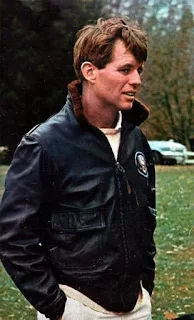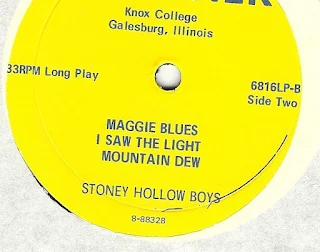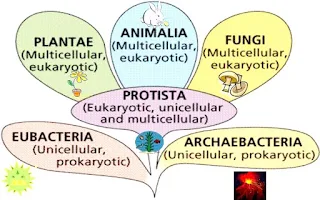Francois Truffaut
When my class of 1968 marched into graduation, I was not among them, for reasons described in the previous post (Graduation Part 1.) Instead I was on the other side of a wall from the ceremony, in the student union parlor, watching a different kind of ceremony on the television set.
That was Sunday, June 9, 1968: fifty years ago today. But this story begins on the previous Tuesday, June 4.
We had some big parties at our house on West First Street in the 1967-68 academic year, the place that housemate Bill Thompson dubbed the Galesburg Home for the Bewildered.
In the fall I remember a mid-party appearance by our new Homecoming Queen, the radiant Shirley Kishiyama. Several of the Stoney Mountain Boys—Rick Lindner, Tom Stern and Mark Brooks on tub bass—set up and performed, and I got to play some guitar runs with them on an improvised jam.
Some of our parties were semi-official, like one we had for a blues artist after his concert. I'm pretty sure it was Bukka White. He brought his classic shiny silver National guitar with him, but when people asked him to play he would just look around the room, pick somebody and hand over the guitar. He always found a guitar player, and laughed, claiming he could just tell. It was the only time I ever got to play one of those steel-bodied guitars.
In the spring, we hosted a party for poet Denise Levertov that drew faculty as well as students. We had the cast party for What's Happening, Baby Jesus there.Then our last party of the year—and the last ever for us—was scheduled for Tuesday June 4: primary election day. It was a Victory Party—we just weren’t sure for who. But Thompson had been working since before the New Hampshire primary for Senator Eugene McCarthy. (He’d even made a halfhearted attempt to get “Clean for Gene,” which basically meant kind of a haircut.) I was supporting Senator Robert Kennedy, and hoped I would be working to elect him President that summer and fall. Both were against the war.
For although the world’s imperfections may call forth the acts of war, righteousness cannot obscure the agony and pain these acts bring to a single child.”
Senator Robert F. Kennedy, in the March 1967 Senate speech in which he broke with the Johnson administration on Vietnam.
Robert Kennedy had been the keeper of the flame after JFK’s assassination in 1963, and President Lyndon B. Johnson knew it and resented it. By 1967 RFK was making speeches on the Senate floor questioning American involvement in Vietnam (which—several historians confirm—his brother President John Kennedy had intended to end in his second term.) But the media usually saw everything RFK did as reflecting his animosity towards LBJ or his political ambitions, or both.
It has since been reported that RFK wanted to challenge LBJ for the 1968 nomination, but felt frustrated that it would be seen only as expressing that animosity, and not as a principled opposition on both the war and on his signature domestic issue, racism and the plight of black Americans, especially in the inner cities.
Until early 1968 it looked as if there would be no anti-war alternative in the November election. Then a relatively obscure U.S. Senator from Minnesota, Eugene McCarthy, entered the New Hampshire primary as a candidate opposing LBJ, and the Vietnam War.
Some at Knox responded quickly. Wendy Saul chaired an exploratory meeting in February. I attended either that meeting or a subsequent one, held in the basement of a women's dorm. I remember being depressed by the discussion, and taking a break from it to sit alone nearby, where I could hear the sound of someone taking a shower. I remember the image because I put it in a poem.
I wasn’t enthusiastic about McCarthy or his campaign. I didn’t believe he could win. But of course if he had remained the only alternative, I would have supported him.
McCarthy did shockingly well in New Hampshire, coming in a very close second to LBJ. RFK felt that he could no longer be accused of dividing the Democratic Party: it clearly was already. But reportedly two other factors pushed him. First, that the generals were asking for 200,000 more American troops, and LBJ agreed. Second, that LBJ wasn’t going to even consider the recently announced recommendations of the Kerner Commission to address the causes of racial strife in the cities.
Robert Kennedy announced his candidacy for President on a Saturday morning in March. It was spring break and Joni and I were visiting Mary Azer and her family in West Chicago. Joni and Mary were Post Hall roommates. I think I met them at the same time the previous spring. I remember Mary, red hair, blue eyes, quietly mischievous smile, showing up at West First Street one night that winter in her Navy blue peacoat to go play in the snow.
So I met Mary’s parents and her younger sister, Barbara, then in high school—dark-haired, energetic, direct, pretty, funny. I remember watching RFK’s announcement, probably in their basement rec room. I knew that now I had my candidate. RFK had political and rhetorical strengths McCarthy didn’t. And as became apparent in the remaining primaries, particularly in California, RFK had enthusiastic support in the black and Latino communities.
I was encouraged, wary and dared to be a bit hopeful. I’d followed RFK’s career from the Justice Department to the Senate in 1965. He was running for the Senate in New York as we started our first year at Knox, and I remember lending a paperback book of his speeches and statements (The Pursuit of Justice) to classmate Nina Palmer with whom I shared a class (probably Spanish), because she was from New York. I noted his first Senate speeches, on nuclear proliferation and gun control. My second year I participated in Prof. Dean Torrence’s mock Senate—for that exercise I was Senator Robert Kennedy.
Not long after RFK’s announcement and his pledge not to attack McCarthy directly, we all heard that LBJ was going to address the nation that night, on April Fool's Day Eve. Joni and I got to the nearest television, which was a few doors down West First at the home of Robin and Lynn Metz. The moment that LBJ announced that he would not run for reelection was surreal and delirious. Now the chances that the war could end had greatly increased. There was dancing in the streets at campuses across America that night. I didn’t see any at Knox, but our hearts were dancing on West First Street.
Then in April, the assassination of Martin Luther King, Jr. RFK was campaigning in a black neighborhood in Indianapolis, and he broke the news to the crowd. He spoke softly, from the heart, mentioning the assassination of his brother. He quoted a line from Aeschylus, his favorite poet, from memory. Then he expressed what was to become an unusual campaign theme:
"What we need in the United States is not division; what we need in the United States is not hatred; what we need in the United States is not violence or lawlessness, but love and wisdom, and compassion toward one another, and a feeling of justice towards those who still suffer within our country, whether they be white or whether they be black.” He urged everyone to "dedicate ourselves to what the Greeks wrote so many years ago: to tame the savageness of man and to make gentle the life of this world.”
The next day he spoke in Cleveland, on the “mindless menace of violence.” He started with the violence of shootings and riots and the war. “Why? What has violence ever accomplished? What has it ever created?”
But he also spoke of less obvious violence, hidden, persistent and insidious: “For there is another kind of violence, slower but just as deadly, destructive as the shot or the bomb in the night. This is the violence of institutions; indifference and inaction and slow decay. This is the violence that afflicts the poor, that poisons relations between men because their skin has different colors. This is a slow destruction of a child by hunger, and schools without books and homes without heat in the winter.”
But he did not stop there. McCarthy got credit for being intellectual, but RFK had the depth derived from classical literature, and so he spoke in ways no other politician could. "The question is not what program we should seek to enact. The question is whether we can find in our own midst and in our own hearts that leadership of human purpose that will recognize the terrible truths of our existence."
And then, a statement that must strike terror in the hearts of Social Darwinists, consciously or otherwise: "We must admit the vanity of our false distinctions among men and learn to find our own advancement in the advancement of all. We must admit to ourselves that our own children's future cannot be built on the misfortune of others."
RFK won primaries in two states, Indiana and Nebraska, that had few elements of his natural constituencies. He lost Oregon to McCarthy however, and so the next big step in the campaign was California, the last and largest primary. A victory there could mean RFK would be the coalition antiwar candidate at the August convention in Chicago. He would be opposed by the establishment candidate, LBJ’s vice president Hubert Humphrey, who supported LBJ and the war.
Our festivities started before the polls closed in the West Coast time zone. It was crowded and loud, with the latest Hendrix, the new Cream on the stereo. But we didn’t have a working television in the house, so every once in awhile Thompson would get on the phone with a friend watching a dorm TV to get the latest speculation and then the vote counts.
I was restless, moving back and forth from the heat and laughter of the party and the cool solitary dark quiet outside. When the call came confirming Kennedy’s victory, I mostly felt relief.
“On to Chicago,” he concluded, “and let’s win there.”
We went back to the house but I was still restless. Something about that ballroom scene, something about how RFK looked made me anxious. So I went back out almost immediately. I began to walk in the cool humid night, the sidewalks moist from recent rain. I headed away from the streetlights, to dark weedy fields. RFK’s victory in California would signal his appeal to anxious party leaders like Mayor Daley, who was inclined to support him. He’d also won that night in South Dakota, within Humphrey’s midwestern sphere of influence. That also would be noted by party leaders. Could it be that the war was going to end? That there would be a President I could believe in again?
The walk calmed me, and by the time I got to West First I was ready for sleep. Then I saw Joni running up the sidewalk towards me, alarmed, frightened. I stopped in front of the Metz house. She stood still in front of me and said as evenly as she could: “Bob Kennedy’s been shot.”
The Metz house was dark but I banged on the door until the porch light came on. When Robin opened the door, I repeated Joni’s words exactly. We both wondered about it later, that we had called him Bob. He was always Robert, or RFK, he was Bobby.
Later Joni told me how she’d heard. Thompson answered the phone, and through the noise of the party’s remnants she heard him saying: “Who?” and then cry “No! No!” At that moment Joni thought something had happened to me.
We turned on the television coverage. The bedlam at the hotel. The first medical reports—Kennedy was alive, but in critical condition. It went on all night. First Lynn then Robin went upstairs to bed. Joni dozed on the sofa, woke up and walked back down the street to sleep. I stayed there, watching, the rest of the night. Frank Mankiewicz, RFK’s campaign press secretary, announced that the Senator’s vitals were good but doctors were about to begin surgery. He had been shot in the head.
The first two plus hours were filled with anxious talk, facts reported and then rescinded and corrected, about the shooting itself, the number of victims and their condition, and the person or people who had done it. There were interviews with witnesses, a lot of talk about a woman in a polka dot dress who had disappeared. For awhile everyone was obsessed with the woman in the polka dot dress.
I remember the NBC reporter Sander Vanocur trying to look in the camera calmly in the atmosphere of shock and hysteria. At one point he reported that police had a suspect in custody whose last name was Sirhan. They didn’t have a first name. So it became the mystery of the hour, what was Sirhan’s first name. Finally he was able to confirm that they knew the first name now: it was Sirhan. His name was Sirhan Sirhan. Maybe it was the reporter, or maybe it was me, but at least one of us almost lost it at that moment.
At dawn I turned off the set, and probably after stopping at the house, walked over to campus. I had early breakfast in one of the dining halls (the one on the corner that isn't the Oak Room.)There was something eerie about that breakfast, both bleak and comforting--I still dream about it. In the dream the room is filled with bright gray light, and it seems a miracle, or a mistake, that I am allowed to eat there.
But for a few moments on that morning it seemed possible that none of what I'd seen all night had actually happened, that nothing had happened to me either for the past several months and I was back at the beginning. But soon I was camped out in the union parlor in front of the television, and it was quickly clear that it all had happened, and was happening now.
Judging from the times recorded in later reporting, it must have been around five a.m. in Galesburg when surgery started. It went on for more than three hours. So I was probably watching the union TV when the coverage was focusing on the medical aspects.
Doctors were interviewed, pointing at charts of the brain. They were not optimistic. Then someone brought new information on the location of the wound. One doctor who saw it got excited. He said if that were true, RFK could be out of the hospital in a few weeks, perfectly okay.
But a few minutes later, that doctor was interviewed again. Pale and shaken, he said that the new information was actually about another victim, Paul Shrade, a California official for the United Auto Workers and a major Kennedy supporter. He’d also been shot in the head, and he did leave the hospital in a few weeks. His was the only apparently serious wound. All five of the other victims survived.
Then the surgery was over, and just past 9 a.m. Mankiewicz said it had gone well, but the next 12 to 36 hours would be critical.
The coverage continued and I kept vigil until I couldn’t stay awake any longer. But after a few hours sleep, I was back again. It was Wednesday evening when Mankiewicz returned to the microphones and said that the doctors were concerned that Kennedy hadn’t show improvement. “Kennedy’s condition is still described as extremely critical as to life.”
So it was now just a matter of time. Time to contemplate, time to look around with different eyes, time to almost forget. Time to relive the nightmarish day that JFK was shot and the weekend that followed. I’d watched it all on television then, too. On that Sunday my family went to church but I stayed home to watch. I saw Lee Harvey Oswald being moved from jail—I was startled by what looked like a gun. But it turned out to be a microphone. And a moment later I heard the shots. I saw Oswald shot on live television.
At four in the morning on Thursday, Mankiewicz stood on the lawn of twisted cables in front of Good Samaritan hospital one last time to make announcement everyone knew was coming: Robert Kennedy was dead.
On Friday the crowds gathered, formed into block-long lines to pass by the casket, to touch the curved cold steel covered in flowers, each with a word of farewell. A reporter noted what words he heard most often: “Forgive us, Bobby.”
Saturday morning was the funeral Mass, with all the dignitaries in attendance. Senator Edward Kennedy gave a brief eulogy: “My brother need not be idealized, or enlarged in death beyond what he was in life, to be remembered simply as a good and decent man, who saw wrong and tried to right it, saw suffering and tried to heal it, saw war and tried to stop it.”
And all day Saturday the funeral train made its slow way to Washington, passing thousands of the unimportant. Many of those gathered, in small groups, families and even alone, or in large groups near the cities, were poor, and many more were black.
Failing to account for the people on the tracks to see the funeral train, the railroad allowed its regular traffic. Several people were killed, including improbably a woman named Antoinette Severini, who died saving her granddaughter. That’s my aunt’s maiden name, though it wasn’t her. Still, given the woman’s name and her location, it’s possible if not likely she was a distant relative.
 |
| Jacqueline Kennedy, her children and her sister |
I’m not sure how much of this I saw as it was happening, but probably quite a lot. Yet I felt compelled to go back to the television on Sunday, to see programs that compiled images of the events.
Having no particular business there I probably should have left campus before graduation weekend, but inertia in packing up to leave was compounded by these paralyzing events. So I was around as families of my classmates arrived. I believe I met Wendy Saul’s father out on the Gizmo patio. I may have seen Barbie Cottral’s parents and her sister Lindsey, who I’d met on a brief visit to Clinton, Iowa the previous summer.
But I believe it was that weekend that I had a singularly memorable experience, so different from the rest of that week. Mary Azer’s parents and sister Barbara were there, and Joni and I probably went out to dinner with them. Joni flew back to Denver on or before graduation day, so this might have been Saturday night.
What I remember is returning with them to their motel in what had to be a prearrangement, because I found myself swimming at night in the motel pool out on the highway somewhere with three lovely young women: Joni, Mary and Barbara. It was heaven, and a little torturous as well. But most of all it was peaceful. The effect was not even completely destroyed when I noticed the black night sky was dominated, not by a silver white moon, but by a large red or orange round neon sign high on a stanchion, probably a Gulf sign. It reflected red in the pool.
But on Sunday, as the graduates gathered, I was back before the student union television. On that day as on the previous ones there were faces and voices on the dotted screen talking about Bobby. Charles Evers, slain Medgar’s brother, with angry tears insisting Bobby did more for blacks than anyone. A longhaired young man claiming that as news came of Kennedy’s impending California victory, Abbie Hoffman was ready to disband the Yippies and call off the demonstration at the Democratic convention in Chicago.
A young aide said Kennedy behind the scenes was advocating American withdrawal from Vietnam when antiwar leaders were only calling for negotiations. The playwright who said that the day he died, Kennedy praised the Watts Writers Workshop and wanted the federal government to fund others. An American Indian writer spoke of Kennedy’s visits to reservations, said Indians considered him a warrior on their behalf.
A steelworker who said he was the only politician who might end the war and still get the hardhat vote. An historian who said RFK had been the best Attorney General in American history. Another who noted that Kennedy reveled in poetry, and once completed a couplet that Richard Burton forgot when the two were reciting for each other by heart.
People really loved him, they said. And people really, really hated him, they said. He knew he was going to be killed, a few whispered.
And pictures of Bobby, smiling and touching, frenzied hands reaching for him, talking softly to children, joking with campaign crowds, pounding his right fist into his left hand. This is unacceptable, he said. This is not satisfactory, he said. We can do better.
A student at a medical school asking him where the money was going to come from to pay for his programs for the poor. “From you,” he said.
Bobby talking about the war, about “the vacant moment of amazed fear as a mother and child watch death by fire fall from an improbable machine sent by a country they barely comprehend.”
And endless repetitions of his last public words, on the podium in California, with people pressed against him, his victory statement. “...the division, the violence, the disenchantment...whether it’s between blacks and whites, between the poor and the more affluent, or between age groups or on the war in Vietnam...we can start to work together. We are a great country, an unselfish country, and a compassionate country. I intend to make that my basis for running...”
Always present, RFK's wife Ethel Kennedy, pregnant. (There's a label on this blog called "land of guns," for the numbingly frequent stories on gun violence and so on. It comes from a line in a poem I wrote at the time about this week, that ends with the image of Ethel Kennedy "swollen/in the land of guns.")
Without Bobby, the war would go on. The mad havoc, the mechanical killing would go on and on in Vietnam, and young men here of my age, boys I’d gone to Catholic schools with or played with in the vacant lots of my home town, sons of salesmen, milk truck drivers, factory workers, cooks for the last rich family in town, as well as young men in my college class, now out there with beaming parents watching, would have to face those awful choices.
I would never have my graduation. But this was my commencement.













































